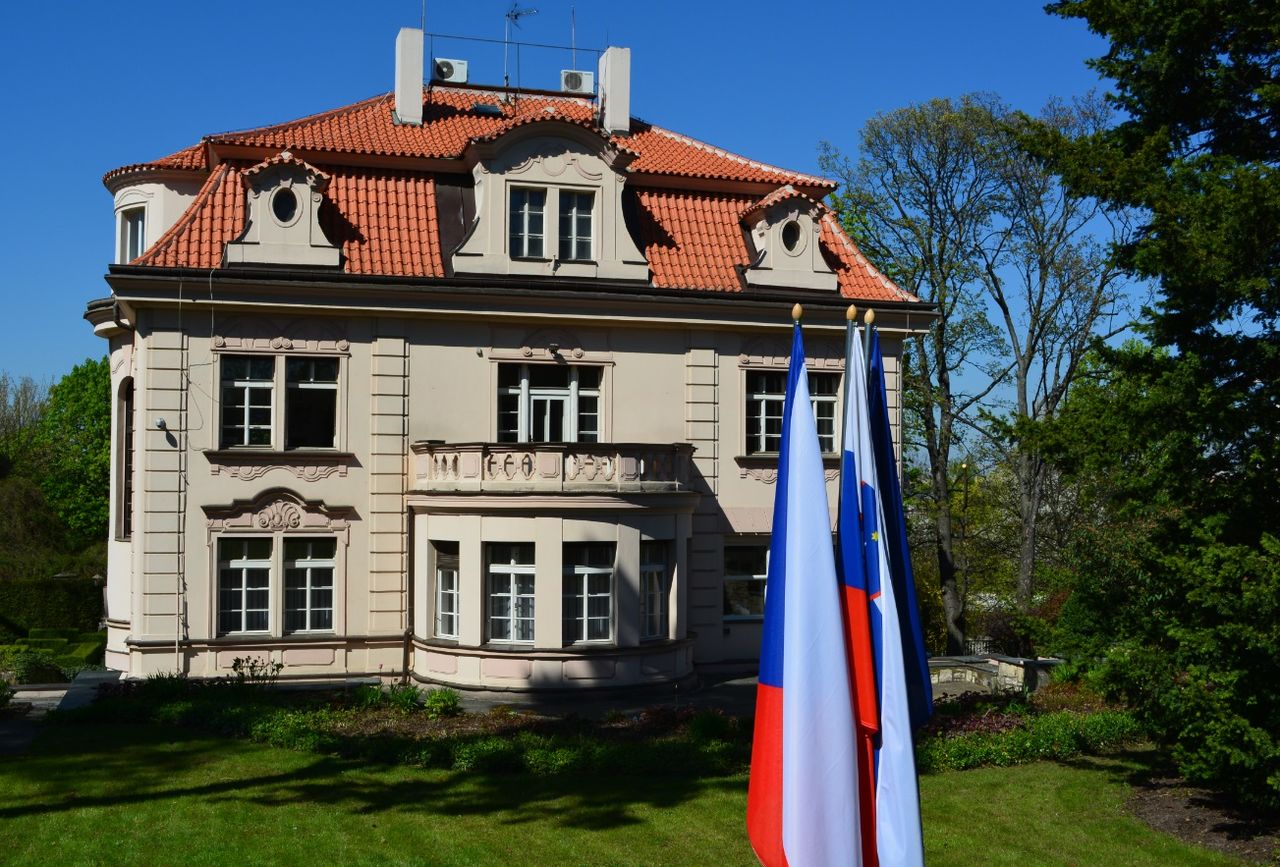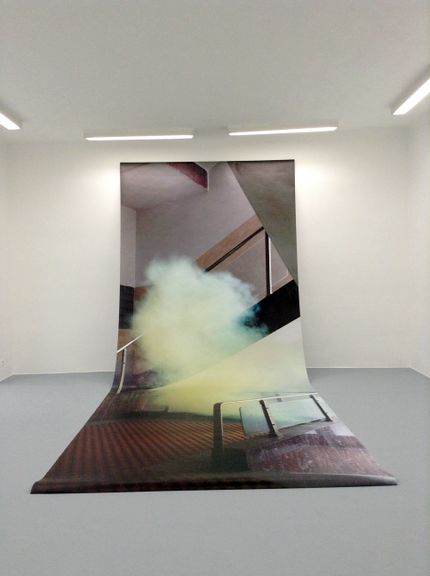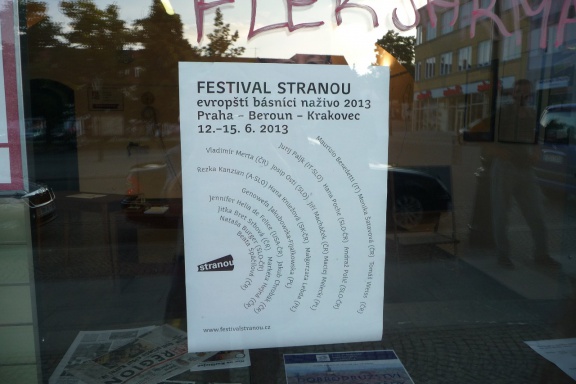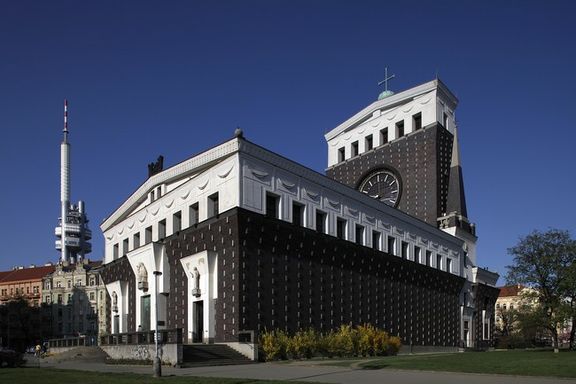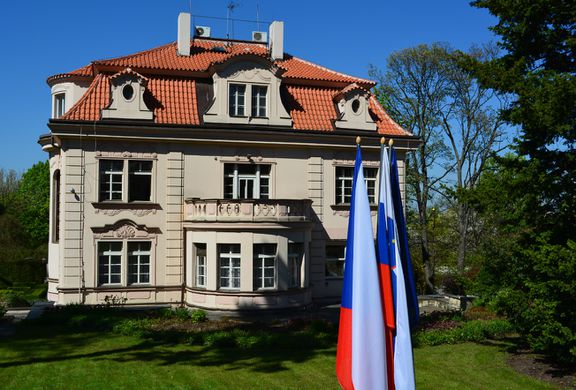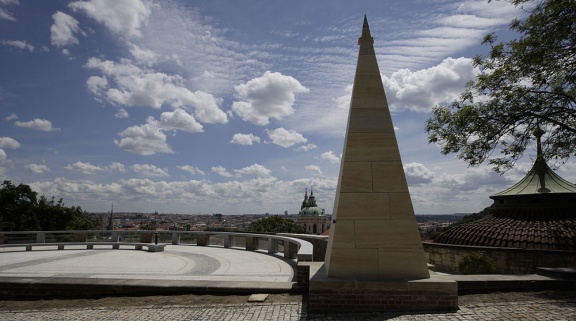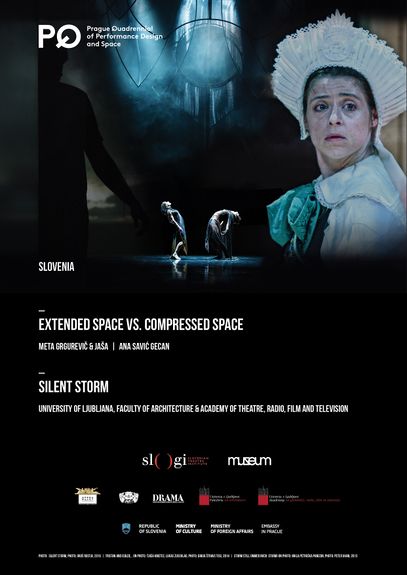Difference between revisions of "Embassy of the Republic of Slovenia Prague"
| Line 134: | Line 134: | ||
== External links == | == External links == | ||
*[http://praga.veleposlanistvo.si/index.php?id=41&L=1 Embassy of the Republic of Slovenia in Prague website] | *[http://praga.veleposlanistvo.si/index.php?id=41&L=1 Embassy of the Republic of Slovenia in Prague website] | ||
| − | *[ | + | *[https://www.gov.si/en/countries/the-czech-republic/ Information on the Czech Republic on the Slovene Government website] |
*[http://www.film-center.si/index.php?module=fdb&op=people&peopleID=538 Filmography of František Čap, Slovenian Film Centre] | *[http://www.film-center.si/index.php?module=fdb&op=people&peopleID=538 Filmography of František Čap, Slovenian Film Centre] | ||
* [http://praga.veleposlanistvo.si/fileadmin/user_upload/dkp_41_vpr/docs/novice/VPR_dokumenti/Ajda_Balderman_Plesnik_vabilo_Ponrepo.pdf Poster from the exhibition ''Jewellery'' by Ajda Balderman Plesnik] | * [http://praga.veleposlanistvo.si/fileadmin/user_upload/dkp_41_vpr/docs/novice/VPR_dokumenti/Ajda_Balderman_Plesnik_vabilo_Ponrepo.pdf Poster from the exhibition ''Jewellery'' by Ajda Balderman Plesnik] | ||
Revision as of 21:15, 14 January 2021
-
7 Dec 2024
A projection of "Vesna" by director František Čáp, widely considered the first Slovene comedy film. On the occasion of France Prešeren's birth, 110th anniversary of Čáp's birth and the film's 70th anniversary, organised by Masaryk University and Embassy of the Republic of Slovenia Prague.
-
29 Oct 2024
Tartini String Quartet, one of Slovenia's best chamber ensembles, will perform at the festival. Supported by Embassy of the Republic of Slovenia Prague.
at the Talichův Beroun
-
to
2 Oct 2024
6 Oct 2024
Slovenian art collective Pjorkkala, with core members Žan Girandon, Pia Grolegar, and Luka Pleskovič, will be exhibiting in the Diploma Selection (student section), as one of the 15 finalists. Their work, "Dodola" is an installation that purifies water, intended as a solution for inhabitants of areas without state water supply, and has been developed as a Master's thesis of Academy of Fine Arts and Design Ljubljana. Supported by Embassy of the Republic of Slovenia Prague.
at the Designblok
-
4 Sep 2024
A live performance of 3:rma, an original project established by guitarist Urška Supej and vocalist Maša But. Supported by Embassy of the Republic of Slovenia Prague.
-
3 Sep 2024
A live performance of 3:rma, an original project established by guitarist Urška Supej and vocalist Maša But. Supported by Embassy of the Republic of Slovenia Prague.
-
to
18 Jun 2024
5 Jul 2024
"Keep your mind clear for the next challenge.", an exhibition by Slovenian painters Maša Gala and Klemen Brun. Supported by Embassy of the Republic of Slovenia Prague.
-
16 Feb 2024
Czech Republic Brno Faculty of Economics and Administration of Masaryk University
On the occasion of Slovene Cultural Holiday, Prešeren Day, a projection of documentary film "Czech House and Czech-Slovene collaboration" by Ladislav Jirásko, with Czech House caretaker and alpinist Drejc Karničar in attendance. Organised by Slovene-Czech Society and Embassy of the Republic of Slovenia Prague.
-
12 Feb 2024
On the occasion of Slovene Cultural Holiday, Prešeren Day, a live acoustic performance of the Hamlet Express group, with band member Andraž Polič reciting his poetry. Organised and hosted by Embassy of the Republic of Slovenia Prague.
-
to
6 Jun 2023
10 Jun 2023
Cvetka Bevc and Vid Karlovšek presenting their poetry and Borut Peterlin's photo exhibition, supported by the Embassy of the Republic of Slovenia Prague
at the Festival Stranou, European poets live
-
15 Sep 2019
The Faces of Expressionism (1905–1925) presenting works by German, Czech and Slovenian expressionists, organized in collaboration with the Božidar Jakac Art Museum, Kostanjevica na Krki and held under the auspices of the Embassy of the Republic of Slovenia in Prague
-
24 Apr 2019
A Slovenian-Czech symposium about Gašper Rojko and Anton Mihelič, the 18th Century rectors at the Charles University, co-organised by the Charles University, University of Maribor and the Embassy of the Republic of Slovenia Prague,
-
to
30 Jan 2018
20 Feb 2018
The exhibition Legacy Stories (Slovenia and the Succession after Yugoslavia), prepared by the Archives of the Republic of Slovenia in cooperation with Radio-Television Slovenia (RTV Slovenia) and the Slovenian Ministry of Foreign Affairs Diplomatic Archives, supported by the Embassy of the Republic of Slovenia Prague,
-
7 Mar 2017
The Prague Acropolis - Plečnik and the Czech nation-building, a talk with two renowned experts on Plečnik’s work Damjan Prelovšek and Tomáš Valena, moderated by Martin C. Putna, organised by the Embassy of the Republic of Slovenia Prague as part of Plečnik Year 2017,
-
to
25 Oct 2016
28 Oct 2016
Czech Republic Nová Paka,Prague Gallery (A)void,Lužický seminář,Novopacké sklepy,Prague,Prague Faculty of Arts
Poets Alenka Jensterle Doležal, Lidija Dimkovska, Barbara Pogačnik and Stanislava Chrobakova Repar, conceived by Alenka Jensterle Doležal, Aljaž Koprivnikar and Andrej Šurla and co-organised by the Centre for Slovene as a Second/Foreign Language, the Government Office for Slovenians Abroad and the Embassy of the Republic of Slovenia Prague,
at the Young Moon, Festival of Slovene Poetesses
-
11 Dec 2015
A literary evening with writer Milan Dekleva, supported by the Embassy of the Republic of Slovenia Prague,
-
10 Dec 2015
A presentation of the Czech translation of The Triumph of Rats attended by the author Milan Dekleva in the framework of the Days of Slovenian Poetry and Prose, supported by the Embassy of the Republic of Slovenia Prague,
-
to
25 Nov 2015
24 Dec 2015
The exhibition Memories of the Isonzo Front, co-organised by the Embassy of the Republic of Slovenia Prague in cooperation with the Tolmin Museum, Milko Kos Historical Institute and the Foundation "Walk of Peace in the Soča Region"
-
to
20 Nov 2015
22 Nov 2015
This Metal has Soul, an exhibition and documentary by the National Museum of Slovenia, Mangart Production Group Ltd and Radio-Television Slovenia (RTV Slovenia), at the International Mountaineering Festival, supported by the Embassy of the Republic of Slovenia Prague,
-
to
4 Nov 2015
5 Nov 2015
Literary events with authors Andrej Brvar, Petra Kolmančič, Danica Križanič Müller, Zoran Pevec, Stanislava Chrobakova Repar (Pivec Publishing House), professor Miran Štuhec (Faculty of Arts, University of Maribor), and singer-songwriters Tadej Veseljak and Klemen Pisk, supported by the Embassy of the Republic of Slovenia Prague,
-
to
4 Nov 2015
6 Nov 2015
Literary events with authors Andrej Brvar, Petra Kolmančič, Danica Križanič Müller, Zoran Pevec, Stanislava Chrobakova Repar (Pivec Publishing House), professor Miran Štuhec (Faculty of Arts, University of Maribor), and singer-songwriters Tadej Veseljak and Klemen Pisk, supported by the Embassy of the Republic of Slovenia Prague,
-
19 Jun 2015
-
to
18 Jun 2015
28 Jun 2015
Meta Grgurevič, JAŠA as set designers and Ana Savić Gecan, costume designer, selected by Barbara Novakovič Kolenc, and students of the Faculty of Architecture, University of Ljubljana and Academy of Theatre, Radio, Film and Television (AGRFT) presented at the Prague Quadrennial of Performance Design and Space (PG). Produced by Slovenian Theatre Institute and Muzeum Institute, in cooperation with Slovene National Theatre Drama Ljubljana and Slovene National Theatre Opera and Ballet Ljubljana, supported by the Embassy of the Republic of Slovenia Prague
-
to
9 Apr 2015
10 Apr 2015
A number of Slovene authors, translation workshops, projects, and a concert by Prismojeni profesorji bluesa, co-organised by the Centre for Slovene as a Second/Foreign Language, the Institute for innovative arts research IRIU, and the Embassy of the Republic of Slovenia Prague,
at the Young Moon, Festival of Slovene Poetesses
-
8 Nov 2014
Pianist Kaja Draksler at the 19th International Jazz Piano Festival, supported by the Embassy of the Republic of Slovenia Prague,
-
to
23 Oct 2014
24 Oct 2014
A number of literary evenings with Slovene authors and artists Jure Detela, Tatjana Jamnik, Alenka Jovanovski, Dejan Koban, Iztok Osojnik, and Klemen Pisk, organised by the Polica Dubova Cultural and Artistic Association, Literary Association IA, and Zveza modro-bela ptica, co-organised by the Faculty of Arts, University of Ljubljana and the Centre for Slovene as a Second/Foreign Language, and supported by the Embassy of the Republic of Slovenia Prague,
-
16 Oct 2014
A presentation of the work of Søren Kierkegaard also featuring Primož Repar (Central European Research Institute of Søren Kierkegaard Ljubljana), organised by the Embassy of the Republic of Slovenia Prague,
-
to
5 Sep 2014
17 Sep 2014
An exhibition and a lecture on the life and work of Janez Puhar, the inventor of the photographic plate, supported by the Embassy of the Republic of Slovenia Prague,
-
to
20 Jun 2014
21 Jun 2014
A screening of the documentary Fabiani:Plečnik, directed by Amir Muratović (Radio-Television Slovenia (RTV Slovenia)), a concert by Samebabe, and other events at the Slovene days of gastronomy and culture, supported by the Embassy of the Republic of Slovenia Prague,
-
to
4 Jun 2014
8 Jun 2014
Slovene authors Ivo Stropnik, Zoran Pevec, Željko Perović, and Ivan Dobnik, supported by the Embassy of the Republic of Slovenia Prague,
at the Stranou International Poetry Festival
-
to
15 May 2014
17 May 2014
Authors Slavko Pregl, Peter Rezman, Dušan Šarotar, and Maja Gal Štromar at the Book World Prague 2014, co-organised by Goga Publishing House, and supported by the Slovenian Book Agency and the Embassy of the Republic of Slovenia Prague,
-
3 May 2014
-
to
10 Apr 2014
25 Apr 2014
Adria Blues, directed by Miroslav Mandić (Gustav Film, Filmostovje, Senca Studio), Feed Me With Your Words, directed by Martin Turk (Bela Film Ltd), and The Elderly Parasite or Who is Marko Brecelj?, directed by Janez Burger (Radio-Television Slovenia (RTV Slovenia)), at the 21st Days of European Film, supported by the Embassy of the Republic of Slovenia Prague and Slovenian Film Centre,
-
12 Dec 2013
An evening of Slovene culture, bringing together music (Klemen Pisk), literature (Ivan Dobnik), and visual arts (Katarina Vladimirov Young), supported by the Embassy of the Republic of Slovenia Prague, Slovene Writers’ Association, and Centre for Slovene as a Second/Foreign Language,
-
29 Nov 2013
A literary evening with Norma Bale, Štefan Kardoš, Robert Titan Felix, and Milan Vincetič, organised by the Slovenian Lectureship Brno and supported by the Embassy of the Republic of Slovenia Prague
-
27 Nov 2013
Evening in the memory of František Čáp organized by Vaclav Havel Library (KVH) in coordination with Czech National Movie Archive (ČFA) , supported by the Embassy of the Republic of Slovenia Prague,
-
to
11 Nov 2013
13 Nov 2013
Andrej Rozman Roza (Rozinteater) touring the Czech Republic with his performances, supported by the Embassy of the Republic of Slovenia Prague,
-
to
6 Nov 2013
20 Dec 2013
A retrospective of František Čáp's work including films Vesna and Ne čakaj na maj, co-organised by the Slovenian Cinematheque and supported by the Embassy of the Republic of Slovenia Prague,
-
to
17 Oct 2013
18 Oct 2013
Literary events with Slovene writer Anja Štefan, supported by Embassy of the Republic of Slovenia Prague and Slovene lectureships in Brno and Prague,
-
10 Oct 2013
A presentation of and handing over Rex chair and table to the Museum of Decorative Arts Prague, supported by the Embassy of the Republic of Slovenia Prague and in cooperation with Impacta Les and REX Kralj
-
to
4 Oct 2013
24 Nov 2013
OFIS_open_files, an exhibition by Ofis Arhitekti, supported by the Embassy of the Republic of Slovenia Prague,
-
to
1 Oct 2013
3 Oct 2013
Days of Slovene Culture organised by Slovene Society Jože Plečnik and Horni Počernice City Library, supported by the Embassy of the Republic of Slovenia Prague
-
to
26 Sep 2013
27 Sep 2013
Jože Plečnik's architecture as an outlet for a dance project Materia by Czech artists (choreography Dana Pala), supported by the Embassy of the Republic of Slovenia Prague
-
to
12 Jun 2013
15 Jun 2013
Slovene authors and poets and a presentation of the anthology of contemporary Slovene poetry, supported by the Embassy of the Republic of Slovenia Prague,
at the Stranou International Poetry Festival
-
18 May 2013
The opening of the exhibition of Plečnik's Sacral Art, supported by the Embassy of the Republic of Slovenia Prague,
-
16 May 2013
A literary afternoon with Maja Haderlap, organized by the Embassy of the Republic of Slovenia Prague in coordination with the Jože Plečnik Association,
-
to
13 May 2013
15 May 2013
Slovene days in Brno, featuring a number of events including a literary evening with Vlado Žabot, organised by the Embassy of the Republic of Slovenia Prague and co-organised by the Študentska založba Publishing House,
-
to
29 Apr 2013
18 May 2013
The exhibition Exploration of Work by Suzana Brborović and Boris Beja, organized by the Embassy of the Republic of Slovenia in Prague in coordination with the City of Brno
-
to
13 Apr 2013
27 Apr 2013
Czech Republic Boskovice,Brno,Olomouc,Ostrava,Prague Art Brno,Art Ostrava,Bio Central Hradec Králové,Lucerna,Panorama Boskovice,Světozor
A Trip by Nejc Gazvoda (Perfo Production), The Year of Hip Hop (Luksuz Production), My name is Janez Janša, produced by Aksioma Institute and co-produced by Maska Institute and Radio-Television Slovenia (RTV Slovenia), at the 20th Days of European Film, supported by the Embassy of the Republic of Slovenia Prague,
-
to
26 Mar 2013
4 Apr 2013
Evenings with Czechs translators of Slovene literature, supported by the Embassy of the Republic of Slovenia Prague,
-
15 May 2012
Concert by Dalibor Miklavčič (organ) and Barbara Štunf (soprano), a lectur by Damjan Prelovšek on Jože Plečnik's sacral architecture, organised by the Embassy of the Republic of Slovenia Prague
-
to
7 Nov 2011
8 Nov 2011
Ksenija Jus Xenia, Aleš Mustar, Iztok Osojnik, Tatjana Jamnik and the translator Jana Šnytová, evening of Slovene poetry and music in Pardubice (Divadlo Exil) and Brno (Salon Daguerre) organised by Literary Association IA, Polica Dubova Cultural and Artistic Association and the Embassy of the Republic of Slovenia Prague
-
5 Nov 2011
Andrej Rozman Roza's Kabarete Simplozij (Rozinteater) and the evening of Slovene poetry and music with Alenka Jenstrle - Doležal, Ksenija Jus - Xenia, Aleš Mustar, Iztok Osojnik, Tatjana Jamnik, Andraž Polič and Ingrid Lemut - Vostráand, organised by Literary Association IA, Polica Dubova Cultural and Artistic Association and the Embassy of the Republic of Slovenia Prague
-
2 Dec 2010
World days of Slovenian literature 2010 - poetry evening by Gregor Podlogar and Primož Čučnik organised by Ústav slavistiky FF MU,Centre for Slovene as a Second/Foreign Language and the Embassy of the Republic of Slovenia Prague
Cultural cooperation
The Embassy of the Republic of Slovenia in Prague is active in different fields of culture. In cooperation with the competent institutions, it promotes Slovene culture and science in the Czech Republic and provides assistance in establishing links between Slovene and Czech partner institutions. The embassy organises cultural events and represents a meeting place for all (Slovenes and Czechs alike) who promote Slovene culture.
The embassy regularly organises activities that coincide with important cultural anniversaries. For example, in 2013 they commemorated the 100th anniversary of the birth of Czech film director and screenwriter František Čap (author of some of the best Slovene and Czech movies before WWII).
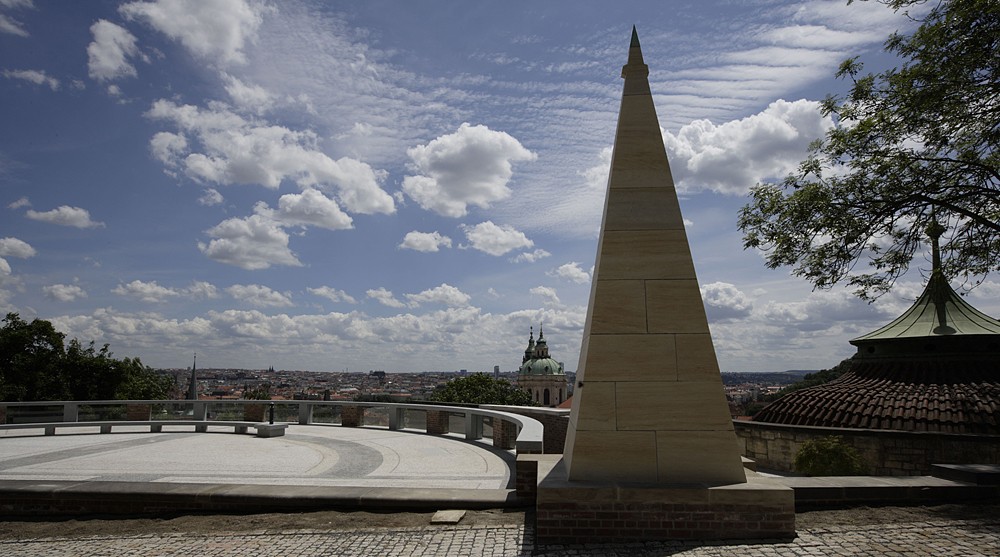 The Czech President at the time, Tomáš Masaryk, appointed Slovene architect Jože Plečnik chief architect for the 1920s renovation of the Prague Castle. Recently the Hradčany south gardens have been newly restored according to Plečnik's plans.
The Czech President at the time, Tomáš Masaryk, appointed Slovene architect Jože Plečnik chief architect for the 1920s renovation of the Prague Castle. Recently the Hradčany south gardens have been newly restored according to Plečnik's plans.
In 2012 activities were tied to the 140th anniversary of the birth of Slovene architect Jože Plečnik as well as the 80th anniversary of the construction of one of his most well-known structures – the Church of the Most Sacred Heart of Our Lord in Vinohrady. Related to these two anniversaries, several important events took place during 2012, such as the re-opening of the south gardens at Prague Castle (now newly restored according to Plečnik's plan), concerts, films and documentary screenings, a new guide book of the church in Vinohrady, and a guide book of the buildings of Jože Plečnik in the Czech Republic by Jiří Podrazil and Zdeněk Lukeš. In 2014 Mr. Lukeš was decorated by the Republic of Slovenia with the Medal for Valour for his contribution in the promotion of the work of the Slovene architect Jože Plečnik.
Slovenian language education
Charles University in Prague and Masaryk University in Brno both have a chair for Slovenian language. In 2005, a chair for Czech language was established at the Department of Slavistics at the Faculty of Arts of the University of Ljubljana.
In 2014 we are celebrating another important anniversary – 100 years since the establishment of the Slovene Lectorate at Charles University in Prague.
Architecture, visual arts and design
In the area of architecture the relations of both nations have been marked by the role and work of the architect Jože Plečnik. Known in the Czech Republic more commonly as Josip, he was a professor of Architecture at the College of Arts and Crafts in Prague between 1911 and 1920.
Plečnik became a topic of thorough researches, including Valena Tomáš's Jože Plečnik – Architecture for New Democracy exhibition in Prague (1996) that resulted in a book of essays in 2013.
Plečnik has also been praised abroad for his high degree of originality and innovation in the use of historical, regional, and even, local features.
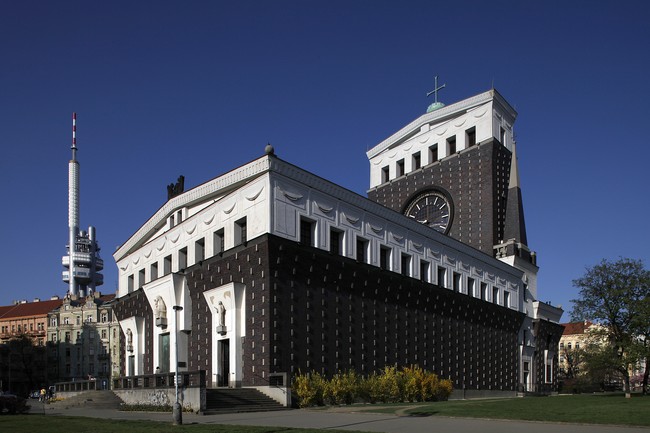
Plečnik's Church of the Most Sacred Heart of Our Lord in Vinohrady is considered by many as the most beautiful modern church in Prague (and according to National Geographic Magazine, one of the most beautiful churches in Europe of the 20th century). The broad, 42m high bell-tower, with its copper dome and crucifix, can be seen in the Prague panorama from as far away as Prague Castle.
A number of exhibitions connected with Plečnik have been presented in various parts of the Czech Republic in recent years. An interesting perspective on Plečnik's work was shown in the exhibition Plečnik's Sacral Art curated by Dr Damjan Prelovšek. Refreshing exhibitions entitled Jewellery (shown in several venues mainly in the years 2012 and 2013) consist of objects made by a gifted Slovene designer and architect Ajda Balderman Plesnik that were inspired by the work of three Slovene female architects who were Plečnik's students.
Thanks to Plečnik's architectural legacy in Prague, the promotion of contemporary Slovenian architecture has made further steps in the Czech Republic. The Jaroslav Fragner Gallery in the centre of Prague has presented several exhibitions in the last years dedicated to Slovene architecture, namely, Blow Up (2012) by Bevk Perović Arhitekti, OFIS_open_files (2013) by Ofis Arhitekti studio, and the exhibition Architecture and Wine in Central Europe (2014), which featured the social and cultural dialogue between architecture and wine-growing, vineyards, and wineries in 8 Central European countries. Jaroslav Fragner Gallery is owned by the Czech Architecture Foundation and is one of the few galleries in the Czech Republic that pays continual attention to contemporary architecture as well as to the history of architecture.
Slovenes have also left an important footprint in the sphere of visual arts. Aleksandra Vajd and her husband, Hynek Alt both hold BA and MA in Photography from the Film and TV School of Academy of Performing Arts (FAMU). They have received numerous grants and awards, among them the 2005 First Prize of the Frame005 Award, Brno. Their work has appeared in numerous exhibitions in the Czech Republic such as Futura and Josef Sudek Atelier, The Gallery of the Capital City of Prague (GHMP), the DOX Centre for Contemporary Art, Architecture and Design, Galerie Rudolfinum, National Gallery to name only few in Prague. They are regularly included in the overviews of the contemporary art of the Czech Republic. Since 2008 they have been leading the Photography Studio at the Academy of Arts, Architecture and Design in Prague.
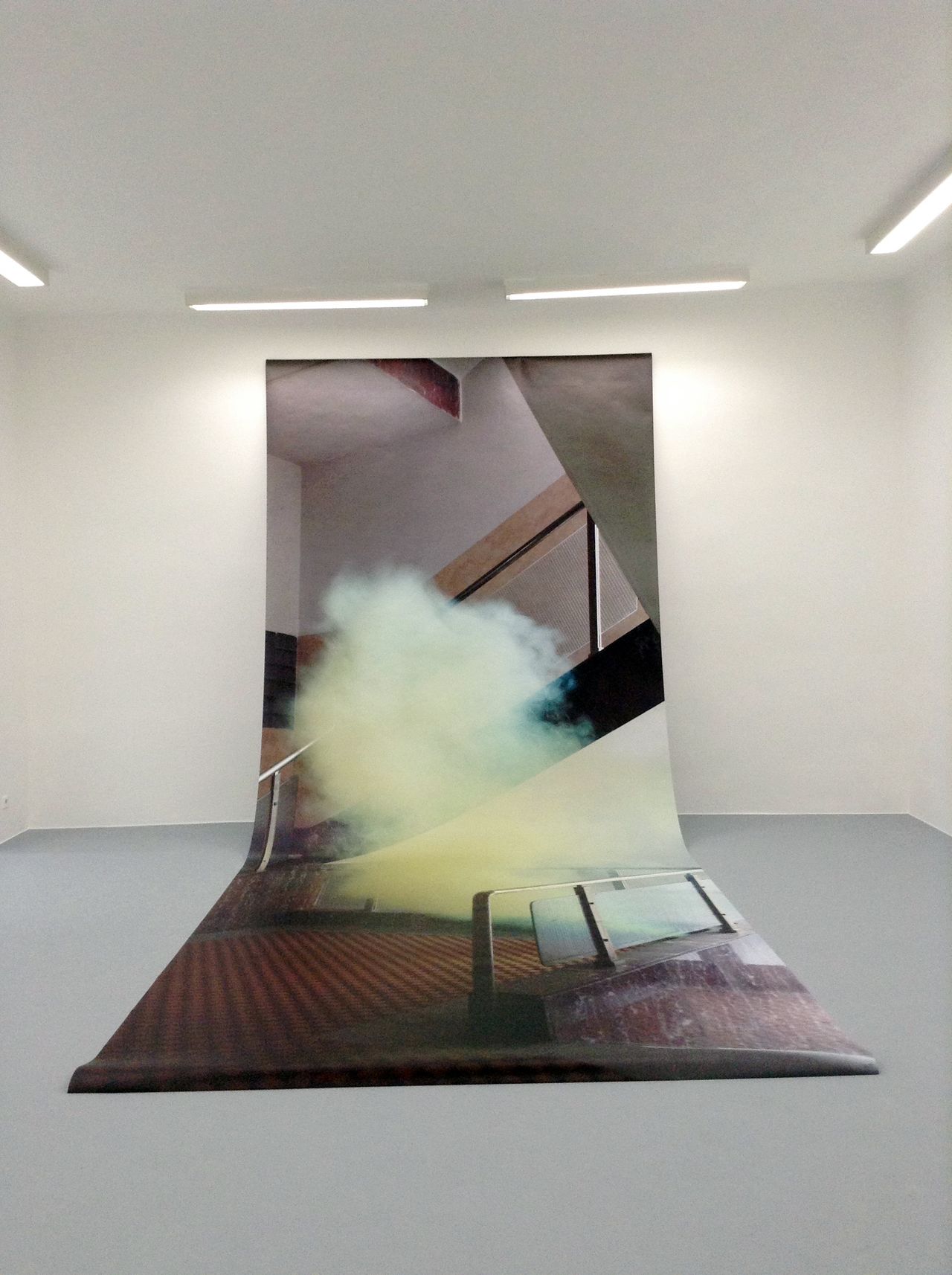 Blind Spot, an exhibition installation by Aleksandra Vajd and Hynek Alt at the House of Arts in České Budějovice, 2013
Blind Spot, an exhibition installation by Aleksandra Vajd and Hynek Alt at the House of Arts in České Budějovice, 2013
In the area of design it is worth mentioning that since 2013 the legendary chairs and table by one of the most famous Slovene designers, Niko Kralj, have been permanently installed in the Museum of Decorative Arts in Prague.
Since 1995 Slovenia participates at the Prague Quadrennial of Performance Design and Space (see below), an overview of contemporary stage set and costume design.
Film
In the film sphere, the cooperation between Slovenia and the Czech Republic is rich. Slovene films have been regularly represented at several international film festivals throughout the territory of the Czech Republic. Probably the most famous of them – the Karlovy Vary International Film Festival has presented several fresh Slovene films in past years.
Under the support of the Embassy of Slovenia in Prague and the Slovenian Film Centre, Slovenia also participates in the film festival The Days of European Film, held annually in Prague, Brno, and some other smaller cities in the Czech Republic. Among film festivals, the Finále Plzeň stands out. Originally organised as a festival of Czech films, it has expanded its programme to include the ZOOM and Industry sections, in which films from other countries, such as Slovenia, are also represented.
The Slovenian Film Centre plays important role in the promotion of Slovenian films in the Czech Republic. Among the activities, special film retrospectives are organised regularly. One recent retrospective took place in November 2013 in Prague and in December 2013 in Ljubljana and was devoted to František Čáp, Czech film director and screenwriter, who directed 32 films between 1939 and 1970. He was active also in Slovenia where he shot some of the most famous Slovene movies of all time, such as: Vesna (1953), Ne čakaj na maj [Don't whisper] (1957) in Naš avto [Our Auto] (1962). With the cooperation of the Czech National Film Archive, these films were part of the retrospective held in Prague and screened for the first time Czech subtitles.
Another important name in the area of film is definitely the young Slovene director and writer Olmo Omerzu. Omerzu graduated from Prague's FAMU (Film and TV School, an integral part of The Academy of Performing Arts in Prague) and in 2013 won the RWE (annual Czech Film Critics Awards) Award for Discovery of the Year for his intimate debut, Příliš mladá noc [A Night Too Young], the only Czech representative at the 2012 Berlinale.
Literature
The sphere of literature is a vivid example of interaction among both cultures, especially in the area of translation. In 2013, Peter Kuhar and Lenka Daňhelová issued an extensive anthology of contemporary Slovenian poetry translated into Czech language, S petdesetimi glasovi govorim/Padesáti hlasy hovořím/I Speak in Fifty Voices. Kuhar and Daňhelová are also the organisers of the International Poetry Festival Stranou which takes place every year in Beroun, Krakovec (Castle), and Prague (Václav Havel Library).
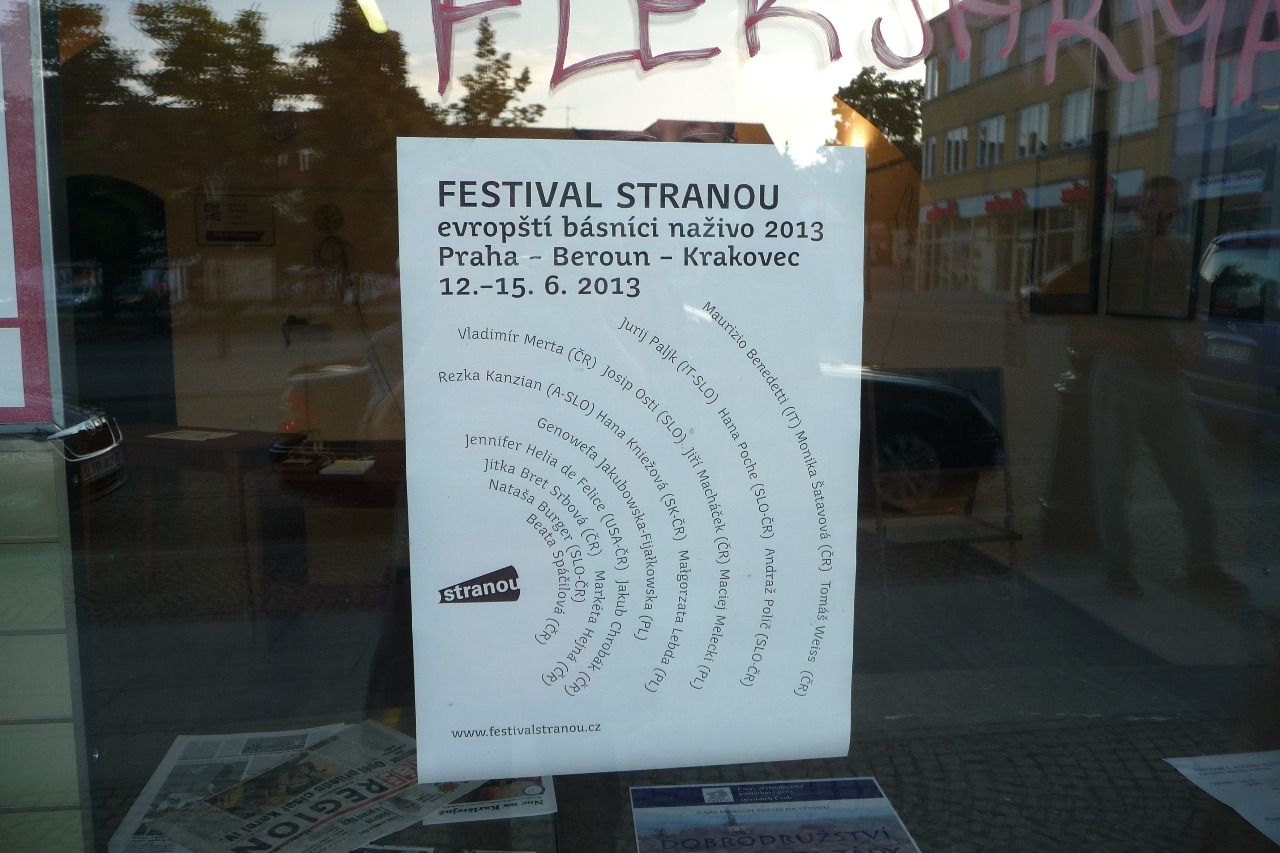 The International Poetry Festival Stranou takes place in Beroun, Krakovec (Castle), and Prague (Václav Havel Library) with Slovene authors participating, supported by the Embassy of the Republic of Slovenia Prague
The International Poetry Festival Stranou takes place in Beroun, Krakovec (Castle), and Prague (Václav Havel Library) with Slovene authors participating, supported by the Embassy of the Republic of Slovenia Prague
One of the most active publishers of translations of Slovene authors into Czech language is Větrné mlýny from Brno. The publishing house organises the “Month of Authors” (Měsíc autorského čtení or MAČ), a literary festival held annually in July that travels from Brno to Ostrava in the Czech Republic, to Košice in Slovakia, then to Wrocław in Poland. While the festival typically represents the literature of the three countries, each year focuses also on the literature of one or more countries or regions beyond them. The 2012 edition included 30 Slovene authors, among them Vida Mokrin Pauer, Andrej Skubic, Milan Dekleva, and Brane Mozetič. Thus far the event has been the biggest presentation of Slovenian literature in the Czech Republic, Poland, and Slovakia.
Numerous other important Slovenian authors have visited the Czech Republic in recent years, such as Boris Pahor, who was in Prague at the end of 2012, and Maja Haderlap in May 2013. Many of the visits are successfully organised by three lectorates of Slovenian language mentioned above.
Svět Knihy is the biggest book fair in the Czech Republic, taking place annually each May in Prague. Slovene authors have been regular guests at this important event.
Performing arts
In the performing arts field, Slovene actress Nataša Burger is actively present. One of her recent and very popular acts is a music and poetry act Voda v poušti/Water in the desert, performed together with Slovene poet and musician Andraž Polič.
Uroš Trefalt works as a director in theatre and TV (rebranding, promo campaigns, music clips). One of the most renowned Prague theatres Divadlo na Zabradli included his performance Duende in its repertoire. In 2014 Trefalt directed the performance Lublana in the Ljubljana Puppet Theatre.
In the area of puppetry, Slovene puppeteer and actor Matija Solce (Teatro matita) has to be mentioned as well. Solce is currently undertaking his doctoral studies in alternative theatre and puppetry at the Prague Theatre Academy (DAMU), on the theme of "The musical perspective of puppet theatre".
Opera director Rocc (Rok Rappl) was deputy artistic director of the Janáček Opera of the National Theatre in Brno from 2008 to 2009, from 2009 to 2011 he was artistic director of the same opera house. From 2011 to 2013 he was artistic director of the Prague State Opera, which from 2012 has been affiliated with the National Theatre Opera in Prague. In November 2013, he became artistic director of the Slovene National Opera in Ljubljana. His latest productions in the Czech Republic are Debussy's Pelleas and Melisande at the National Theatre, Lohengrin (R. Wagner, NDM Ostrava, March 2013) and Ivo Medek's Alice in Bed at Janaček Opera in Brno, May 2014.
Prague Quadrennial of Performance Design and Space
In 1995 Slovenia took part in the *Prague Quadrennial of Performance Design and Space (PQ) for the first time, featuring the work of stage director and set designer Meta Hočevar. Later on the National Theatre Museum of Slovenia organised participation of a number of acknowledged stage and costume designers working in Slovenia, e.g. Alan Hranitelj, Ema Kugler, Dunja Zupančič & Miha Turšič (Noordung Cosmokinetic Cabinet) (curated by Tomaž Toporišič and Belinda Radulović in the Extreme Costume section. In June 2015 Meta Grgurevič & JAŠA and Ana Savić Gecan create their installation curated by Barbara Novakovič Kolenc in the scope of the Shared Space: Music Weather Politics international exhibition, and, for the first time, students of the Faculty of Architecture and the Academy of Theatre, Radio, Film and Television (AGRFT) of the University of Ljubljana participate in the Student Section of the PQ.
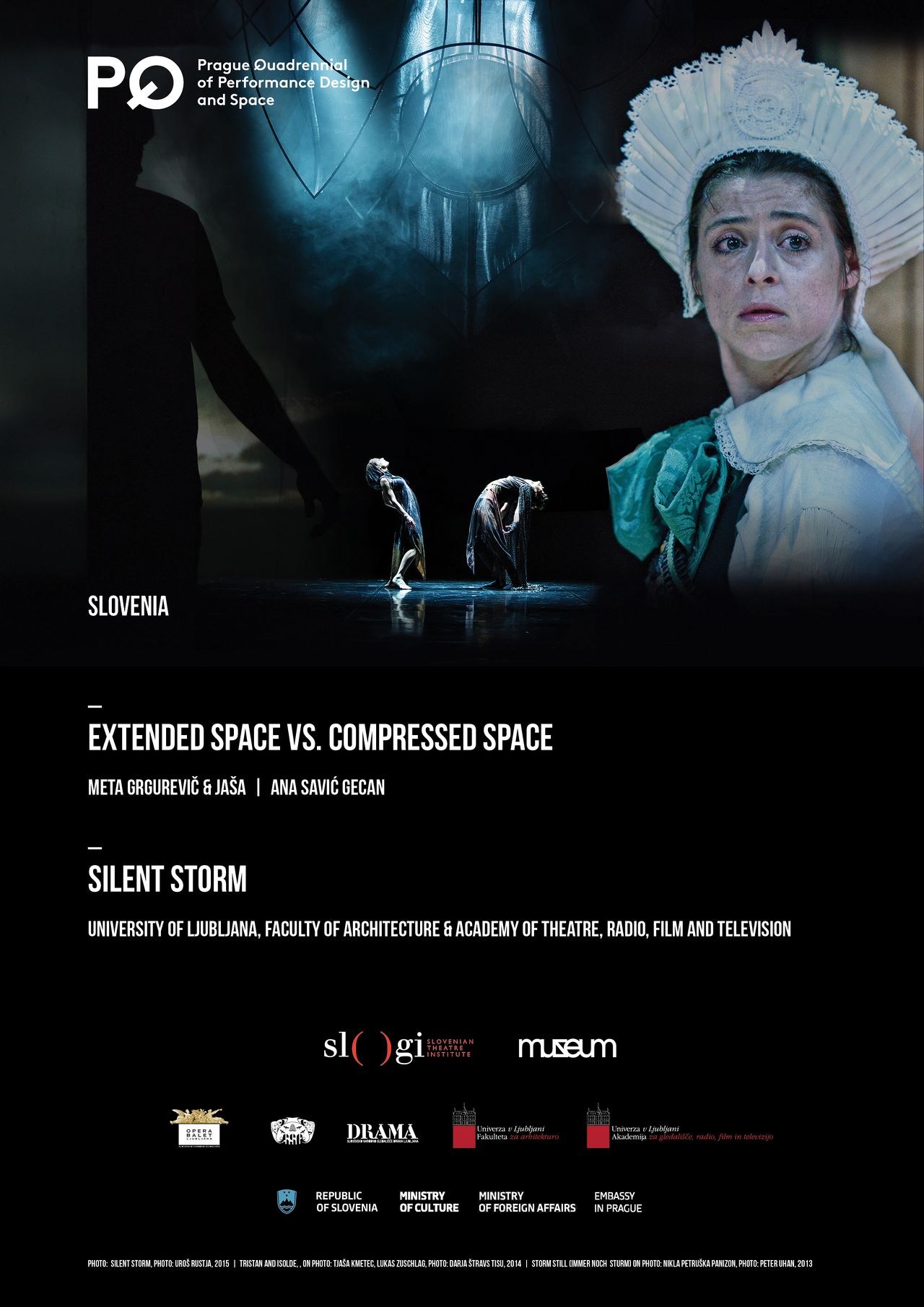 A flyer for the Slovene contribution at the 13th Prague Quadrennial of Performance Design and Space (PQ curated by Barbara Novakovič Kolenc in June 2015.
A flyer for the Slovene contribution at the 13th Prague Quadrennial of Performance Design and Space (PQ curated by Barbara Novakovič Kolenc in June 2015.
Slovenes in the Czech Republic
The oldest operating Slovene society in the Czech Republic is located in Brno. Founded on 1 November 2002, its president is Alena Šamonilová.
Since 14 February 2013 there has been another Slovene Society, named after Slovene architect Jože Plečnik. The seat of this society is in Beroun near Prague, with Iztok Toplak as its president. One of the more visible activities of this society were the Days of Slovene Culture taking place in Horni Počernice, in the western part of Prague. Exciting programme comprised literature readings, exhibitions, presentation of Slovenian traditional craft, concert as well as demonstration of traditional Slovenian cuisine and touristic destinations.
The majority of Slovenes living in the Czech Republic are connected with Slovene companies that operate there. Many Slovenes are also closely interlinked with culture. Students from Slovenia represent another important portion. Every Friday, there is a class of Slovenian language for the Slovene children living in Prague. Numerous performances for Slovene children have taken place in these premises during recent years (such as story reading afternoons with Anja Štefan, Andrej Rozman Roza, Melita Osojnik, Barbara Mioč Spalević, and performances from actors like Matija Solce).
Several young people from Slovenia have studied at the eminent Film and TV School of the Academy of Performing Arts in Prague, or FAMU, one of the oldest film schools in the world, located in Prague. Several of the FAMU alumni from Slovenia have received international acclaim (for example, Janez Burger, Janja Glogovac, Olmo Omerzu). Some puppeteers studied at the Department of Alternative and Puppet Theatre of the DAMU (for example, Silvan Omerzu or Matija Solce).
See also
External links
- Embassy of the Republic of Slovenia in Prague website
- Information on the Czech Republic on the Slovene Government website
- Filmography of František Čap, Slovenian Film Centre
- Poster from the exhibition Jewellery by Ajda Balderman Plesnik
- Programme of the 2012 MAČ literary festival, with videos of Slovene guests
- The Days of Slovene Culture 2013 programme



